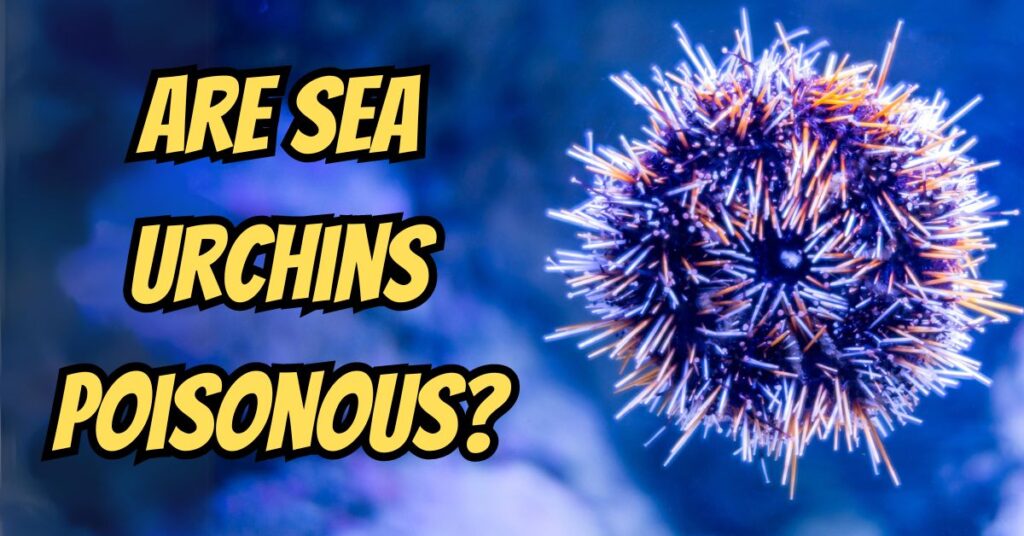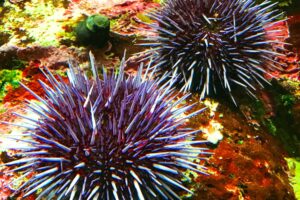
Table of Contents
Introduction: A Prickly Encounter
Have you ever strolled across the ocean shore, felt something prick your foot, and wondered, “Are sea urchins poisonous?” These spiky marine critters, resembling little pincushions of the sea, often spark curiosity and caution among beachgoers and divers.

While their appearance screams “stay back,” there’s a fascinating world to uncover beyond those intimidating spines. So, let’s dive in, shall we?
The Ocean’s Chocolate Box: A Spiny Surprise
Picture this: you’re wading through the shallows of a serene beach, where the only sounds are the whispers of the ocean kissing the shore. Suddenly, ouch! You’ve stepped on nature’s version of caltrops – a sea urchin. This encounter might leave you pondering, “Are sea urchins poisonous, or just another victim of my clumsy aquatic ballet?”
The truth is, sea urchins are a mixed bag, a kind of underwater Forrest Gump chocolate box – you never know what you’re gonna get!
Venomous or Victimless: The Sea Urchin Dichotomy
Most sea urchins, equipped with spines for defense, aren’t out to launch a venomous vendetta against your foot. However, some species, like the flower urchin, are indeed poisonous, harboring venom within their spines.
Think of them as the ocean’s version of a sleeping dragon; peaceful if undisturbed, but woe betides the unfortunate soul who provokes them! According to the MarineBio Conservation Society, an authority on oceanic wildlife, sea urchins are incredibly diverse, comprising about 950 species in total, each adapted to its unique ecological niche. While not all are venomous, the few that are, command a healthy dose of respect and caution.

From Ocean Menace to Culinary Delight
Interestingly, sea urchins are a delicacy in many cultures, coveted for their roe, known as uni in Japanese cuisine. It’s an acquired taste, like kissing a wave and getting a mouthful of ocean essence. This contrast is fascinating; one moment, they’re the spiky menace beneath the waves, and the next, they’re the belle of the seafood ball!
First-Aid for Urchin Encounters
What should you do if you’re the recipient of an unwanted urchin jab? First, don’t panic; it’s not Poseidon’s wrath, just an oceanic oopsie.
Soak the area in hot water to ease the pain; the heat can also help to neutralize some venoms. Remove any spines carefully, as you would a splinter from a terrestrial misadventure. Keep the wound clean and seek medical attention if you notice signs of infection or if you suspect it was a rendezvous with one of the venomous kinds.
If there are lifeguards in the beach, they will be well equipped to deal with any mishaps you may have. Be sure to get help from them if you ever need it whilst on the beach.
Remember, the sea doesn’t take prisoners, but it does occasionally poke its visitors!
Personal Anecdote: Family Adventures in Rock Pooling
But let’s paddle away from the theoretical and wade into personal waters for a moment.
I recall a sun-kissed day, not too long ago, when I embarked on an oceanic adventure with my two boys, our hearts set on unraveling the mysteries of the deep, armed with nothing but our curiosity and a trusty tide pool guide. Our mission? To seek out sea urchins and other elusive sea creatures in their natural hideaways amidst the rocks.

Life Lessons from the Tide Pools
That day, amidst the rock pools, we learned more than just whether sea urchins are poisonous. We discovered reverence for the ocean’s intricate tapestry of life. We learned that with curiosity comes responsibility — the responsibility to tread lightly and respect all creatures great and small, spiny or smooth.
The Ocean’s Gentle Reminder
So, the next time you venture into their saline stronghold, give a polite nod from a safe distance. After all, the ocean is their turf, and we’re just guests, fortunate enough to glimpse its wonders.
Are sea urchins poisonous?
Some are, but they all deserve our respect and careful attention. It’s their underwater realm; we’re just swimming in it!
While not all sea urchins are the villains in our seaside saga, their defensive armaments require careful consideration. The ocean whispers many secrets, and one of them is the subtle reminder that we share this blue planet with creatures as diverse as the stars in the night sky.
So, tread lightly, swim cautiously, and live harmoniously with the prickly poets of the sea.
Our journey into the ocean’s depths doesn’t end with uncovering whether sea urchins are poisonous. There’s a vast expanse of marine life mysteries waiting to be explored, many with pressing concerns that echo across the oceans.
For instance, the formidable great white shark, an apex predator of the marine world, faces challenges that threaten its survival. Are these majestic creatures teetering on the brink of endangerment?
Dive deeper into this urgent conversation by exploring our in-depth article, “Are Great White Sharks Endangered?” and join us in unraveling another enigma of the deep blue. Your voyage into marine conservation awareness is just beginning!
